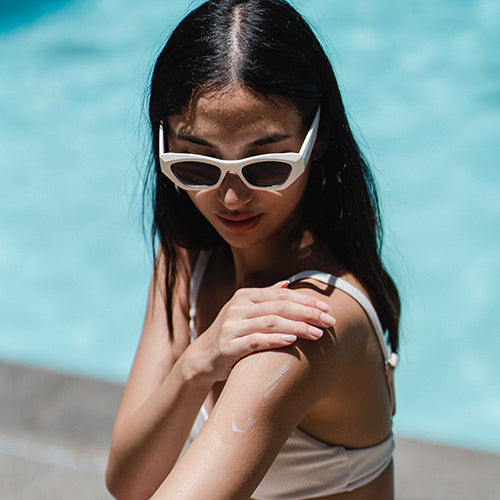
Can Sunscreen Make Acne Worse?
Great news! It *is* possible to protect yourself from UV rays while you're treating your acne.Published:
2 minute read
No excuses: wearing sunscreen every day is crucial, even if you have acne. Our founder, dermatologist Sandra Lee, MD (aka Dr. Pimple Popper) has heard it all — from “but it’s not sunny out!” (we’ve dispelled that one) to “I was born with a natural tan, I don’t need SPF!” to “sunscreen makes me break out.”
Listen, we get it. Greasy, oily sunscreen feels gross on your face. But trust us when we say that it is possible to protect your skin without clogging your pores and making your acne worse.
Can sunscreen cause acne?
According to Dr. Lee, the answer to this one is no: sunscreen active ingredients don’t typically cause acne breakouts. But that doesn’t mean certain sunscreen formulations won’t make you break out.
How does this happen? Let’s remember that all acne starts with clogged pores. When oil and dead skin cells become trapped, it provides the perfect environment for C. acnes bacteria to thrive. Next thing you know, you’ve got a pimple (or many).
Certain skincare ingredients are more likely to lead to clogged pores than others — in technical terms, they’re more comedogenic. So it all depends on what exactly is in your sunscreen besides the actual SPF ingredients: things like fragrance, oils, preservatives, or dye can make a product likely to clog pores.
But doesn’t sunlight clear up acne?
Nope! In fact, the opposite is true: ultraviolet light exposure leads to damage that compromises the skin barrier, making acne breakouts more likely. In other words, that longtime myth you’ve heard about letting your acne dry up in the sun? Entirely false.
Another important thing to note: sun exposure darkens pigmentation. If you’re dealing with post-inflammatory hyperpigmentation — those slow-healing acne “scars” you’ve been trying to get rid of — you want to avoid UV exposure. The sun can make those dark marks look even worse, because radiation encourages your skin to deposit more melanin, which is the pigment responsible for tanning/darkening the skin.
How to find the right sunscreen for acne-prone skin
We understand it can be a challenge to find the right sunscreen formula for oily or acne-prone skin. And it is true that the wrong type of sunscreen can lead to more acne.
So it makes sense that someone with acne or oily skin might have a complicated relationship with sunscreen: you don’t want to get burned, but you also don’t want to risk a breakout. Luckily, says Dr. Lee, there are sunscreens out there that are formulated with acne-prone skin in mind. Look for packaging that says “non-comedogenic,” “won’t clog pores,” or “oil-free.”
Of course, Dr. Lee is partial to her SLMD Dual Defender, a lightweight moisturizer and sunscreen in one, that’s formulated for people with oily or acne-prone skin. It’s both oil-free and non-comedogenic, with broad-spectrum protection to guard against both UVA and UVB rays.
What about “natural” or “clean” sunscreen?
We’ve talked about this kind of skincare labeling before: with no oversight by the FDA, it’s all a bunch of marketing mumbo-jumbo. There’s certainly nothing wrong with seeking out skincare that’s more “Earth-friendly” or “sustainably sourced” — just know that these terms should be taken with a grain of salt.
And if you’re actively treating acne (with a routine like our SLMD Acne System), you might want to think twice before layering on a product that contains “all-natural” oils like coconut, which can definitely clog your pores.

Dr. Lee's Last Word
You absolutely should not skip the SPF if you’ve got acne-prone skin. In fact, UV damage can make your pimples worse. Choose products labeled non-comedogenic and make sure you wash your face before you go to bed.



















